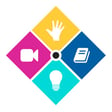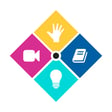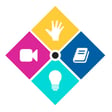Become a Creator today!Start creating today - Share your story with the world!
Start for free
00:00:00
00:00:01

New Grad Nerves
Miranda and Shannon talk about being a new grad and tips for getting through you first year of clinical practice.
Recommended
Transcript
Introduction to the Mentorship Series
00:00:03
mmateri
Hi, I'm Miranda Matiri.
00:00:05
Shannon Skowbo
And I'm Shannon Scalvo and we are Hand Therapy Academy.
00:00:09
mmateri
Hi Shannon, welcome to your first podcast with Hand Therapy Academy.
00:00:13
Shannon Skowbo
Thank you.
00:00:14
mmateri
We're getting a little different. We're starting a mentor mentorship series and this is where we're asking some of our um therapists that work for us where they can ask us anything, ask us questions, things they're dying to know.
Shannon's Path to Hand Therapy
00:00:28
mmateri
And our first one is Shannon, Shannon, why don't you tell us a little bit about yourself?
00:00:33
Shannon Skowbo
ah Yeah, so I am um the most recent hire. um I just graduated from Northern Arizona University um Just back in May and I actually just passed my boards Like two weeks ago. So um the newest of new grads that you could get um And I am looking to get my CHT one day um Yeah, so working at working at your clinic in the hand therapy setting
00:00:57
mmateri
Well, congratulations on passing your boards. I know we're really looking forward to having you on as a full fledged therapist. um Why don't you tell us why you're interested in hand therapy and those things, and then we'll get into you asking me the questions.
00:01:11
Shannon Skowbo
It's funny because I wasn't, as you know, interested in hand therapy at all. um I actually really didn't want to go into it. and But I ended up, because of that, ended up being placed in a hand therapy rotation. um And I think the real reason like why it I love it so much is because it feels like it's always a puzzle, and there's always something new to learn. And so um in that sense, like I could never get bored. um And I love learning. so
00:01:37
mmateri
Yeah, I do feel like it's a great setting if you love learning because you're always going to be learning for sure. Even 20 years later. All right. Why don't you go ahead and ask me your first question.
00:01:50
Shannon Skowbo
Okay.
Influential Resources in Hand Therapy
00:01:51
Shannon Skowbo
ah My first question is, what books have made the most significant impact on your career?
00:01:58
mmateri
Oh my gosh. Okay, so i there are a couple that I think are staples, and this is in terms of hand therapy, and um there's also some that are non-hand therapy related that I'll share with you as well. And I think they are probably books that I have given you because I usually give them to students as well. But I'll share with everyone. One is rehab of the hand. And when I first started, it was like a yellow color. And I remember I asked my parents to give me that book for Christmas. And I got the book for Christmas. And it was like the best gift ever. um So I think that's a big one. And I still use it to this day often. So um it probably it probably never goes a week where I don't like crack it open, at least to look for something. So I think that's a great resource. It is very overwhelming, I think, as a ah new grad and as a student. So I do understand that. And I wouldn't say like, go read chat.
00:02:50
mmateri
i mean do what's best for your learning style, of course. But I think just looking up answers in there that you're looking for is very helpful. I think if you try to read a chapter for chapter, when you're first starting, it could be a little overwhelming. And then next, I love um the purple book. And that is, I think, a really great book for quizzing yourself and asking questions. I like the older purple books better because I feel like they're a little smaller and more condensed. i The new one is um so heavy with
00:03:20
mmateri
a lot of information, I think that too can be overwhelming. So I think as a new grad, I would probably even just try to find an older one. And I don't think they've, I mean, they've added a lot of new content. So I think if you're studying for the CHT, yes, you can get that one later, but start with the smaller one. And then um one book that I think is was really powerful for me that's non-hand therapy related is The Magic of Thinking Big. And I just love that book and it it makes you think that, um or just like reading people's stories, just because it's been done before it doesn't mean you can't do it again and do it better or in a different way. So I think I was really nervous about starting a hand therapy practice, but after reading that and exploring that, it was basically saying,
00:04:03
mmateri
It's okay if there's a lot of competition in the market, because that's what a lot of my peers were telling me. And people who I looked up to and mentored me were telling me the market's pretty saturated. They weren't sure if it was a good idea. But reading that, I was like, no, I think I can do it. I think I can do it. And I can do it in a different way that makes our service a little different from everybody else's. So that book was very influential for starting out.
00:04:27
Shannon Skowbo
Oh, my next question.
Evaluating Tendon Therapy: Qualitative vs Quantitative
00:04:29
Shannon Skowbo
um So I feel like um in the clinic, of there's certain things that are kind of like the meat and potatoes of hand therapy and one of them is like but anything involving tendons, right tendonitis, tendinosis, tendinopathies in general. um But like from my understanding, like fair like the research on like um how beneficial therapy is for that um isn't the best. um And so i I think I find myself, since we like see it so much, is like I don't necessarily believe in the therapy we're doing.
00:05:02
Shannon Skowbo
um So and like you kind of need to write for like patient buy-in and just like what like what are we really doing here sometimes.
00:05:07
mmateri
Definitely.
00:05:09
Shannon Skowbo
um So I was just wondering like how you navigate tendon stuff um like specifically tendon tendinopathy.
00:05:14
mmateri
I think, yeah, I think that's a great question. And I think um when we think about research that's available, you know, we're always thinking like, okay, there's like this quantitative, we always look at quantitative data, right? We're thinking, and we're not always looking at qualitative data either. And I think there's not, um I think that's where we lack, like maybe some of our interventions, that the data and the research needs to be driven from a qualitative aspect because I think um you know, the patient may continue to still have tendonitis, but we may have significantly changed some of the tasks that they were able to do.
00:05:50
mmateri
Like, did we modify their desks? Like say if it was a lateral epi or something like that, do we modify their desk station? Are they able to do their job now? You know, and those things you wouldn't pick up with a quantitative research method, right? Unless, you know, you and you wouldn't have enough thought.
00:06:02
Shannon Skowbo
Hmm.
00:06:04
mmateri
I think it would be difficult to study that is what I'm getting at. So I think you may not see these differences that you're, maybe wanting to see based on the objective measures that we document in WebPT or we document for insurance purposes, but I do think um that we can have a significant impact. And maybe it's not that you know we're seeing them three times a week for six weeks, we may be seeing them three or four times a week, or maybe not three or four times, three or four times and then that's their treatment and we have them come back in a few months and see if any of those interventions have made a difference. So I do agree with you sometimes doing the,
00:06:39
mmateri
The manual stuff and all that stuff can feel repetitive and not like it's making a difference, but I think there's other ways that we make a difference. And a lot of it is, you know, activity modification, joint protection, teaching them daily exercises. And there's obviously a psychosocial component that I think we as OTs are very good at addressing. So I guess as a new grad, i I would encourage everyone or even, you know, even older therapists that may be thinking that way. I think we have to broaden the way we think about it and and know that we do make a difference in those ways.
00:07:08
Shannon Skowbo
Right. I think that's a good point. Cause like I always am like it, cause I think it's one of those things you see them week after week and it's like really the education and like stuff you're giving them now is going to be impactful a way longer down the line. Right. Probably at the point where you're not seeing them anymore. And that's where it starts to feel like a little helpless.
00:07:27
mmateri
It definitely does, and for those patients, like i don't I don't tend to like keep seeing that, you know like this like we got it's more like I'm teaching them what to do, and if I'm doing a good job teaching, I'm giving them the skills to hopefully, one, get a little bit better and be preventing it from occurring again, right?
00:07:33
Shannon Skowbo
Right.
00:07:43
Shannon Skowbo
Right.
00:07:43
mmateri
Because then I'm going to start talking about strengthening their periscapular muscles, I'm talking about unloading those tissues.
00:07:49
mmateri
i So I think some of those things are really hard to measure, and that's what our research is lacking in.
00:07:55
Shannon Skowbo
right
00:07:56
mmateri
So.
Managing Patient Expectations in Recovery
00:07:57
Shannon Skowbo
um My next question is, what is your least favorite question to get asked by patients?
00:08:05
mmateri
Oh gosh, that is a hard one.
00:08:11
mmateri
I, you know, it probably depends on the day.
00:08:14
Shannon Skowbo
Like personally, as a new grad, my, one of my least favorite questions, um, is like, when do you think I'll be better? Like, uh, when is this, like, can you just, and a lot of times they'll want like an exact, like this many weeks, this many, and sometimes I feel like if you say something like that, they'll hold on to it. Whereas like every body is different. And like, of course you can navigate that, like using research and like, here's what like we typically know. from this, um but like every person's different. like I feel like that, especially as a new grad, you don't always know like the timelines. and that so Personally, that's my least favorite question.
00:08:48
mmateri
Yeah, I could definitely see from a new grad's perspective and I think you answered, you know, just those things you're telling me like everybody's different. This is what the research says. And then sometimes I say, I don't know, right? Like it's okay to not know. And I say, you know, I don't know. I'll ask my peers. I'll ask someone and I do that all the time. I'm going to ask Josh and see what he thinks or I'm going to look it up and see what that, you know, if there's any new research on it. And I think, Patients understand that and I think they appreciate you being vulnerable to say I don't know instead of just saying I think and sometimes we don't know right like We we don't have crystal balls.
00:09:21
Shannon Skowbo
Right.
00:09:26
mmateri
We don't know this, you know, sometimes those things so and they say and I always tell them a little we'll know when you know, you stop making changes or maybe you're you know 95% better like there's different benchmarks for everyone when we decide um That we're done with the therapeutic relationship Yeah
00:09:27
Shannon Skowbo
Mm hmm.
00:09:44
Shannon Skowbo
Right.
00:09:46
mmateri
Those were great questions. Okay. I think that wraps up our time, Shannon. Thank you so much for jumping on with us today. It was great having you and I look forward to having you back.
00:09:56
Shannon Skowbo
I can't wait to be back.
00:09:57
mmateri
Yeah.
Where to Learn More
00:09:58
mmateri
So for more information, check us out at handtherapyacademy.com. That's the Instagram handle or www.handtherapyacademy or email info at handtherapyacademy.


